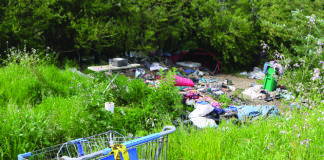
WATSONVILLE—The three candidates vying for the Fourth District seat on the Santa Cruz County Board of Supervisors squared off in a forum Tuesday night, touching on transportation, housing and other issues affecting the county.
The forum was hosted by the Santa Cruz County Chamber of Commerce, held in person at the Watsonville Civic Plaza Community Center and via Zoom.
Ed Acosta, Jimmy Dutra and Felipe Hernandez are running for the seat currently occupied by Greg Caput, who has held it since being elected in 2010. All three are lifelong Watsonville residents.
Acosta holds a seat on the Santa Cruz County Office of Education Board of Trustees, and on the Watsonville Planning Commission. He says this, and his experience in the agricultural industry—where he holds a management position—has given him an understanding of the hard work necessary for the position.
“I’m here because I love our district, and I love the City of Watsonville and our community,” he said during his opening statement.
Dutra sits on the Watsonville City Council, and served as mayor last year. He is also a teacher with the after-school program at Lakeview Middle School.
“We need somebody to go to the county to actually get the resources and funding we deserve,” he said. “It has been too long for us down here in South County not being able to get the equitable amount of services and resources that we deserve.”
Hernandez served on the Watsonville City Council for nine years, including a stint as mayor. He now sits on the Cabrillo College Board of Trustees.
“I want to make sure that Watsonville gets its fair share and make sure that we build consensus within our supervisors’ board, and that we build good relationships with the rest of our supervisors,” he said.
Tourism and agriculture
Dutra says he supported the building of Hampton Inn & Suites—which opened in Watsonville on Lee Road last year—which he says now reigns in $50,000 in monthly tax revenue.
“I will continue to work to make sure the city is pursuing that type of revenue,” he said. “We see how lucrative it is in Santa Cruz, and we too can have that in Watsonville.”
At the same time, Dutra says he supports Measure U, the two-decade-old ordinance that stops urban growth into agricultural land, and which will come up for an extension in November.
“To me it is not just a measure, it is a way of life,” he said.
Hernandez says that, with the importance of tourism obvious in the county—and with wineries and other attractions drawing people to South County—it’s important to support the workforce that powers those industries.
Among other things, he says this means improving the county’s transportation system and reducing the “gridlock” traffic that clogs Highway 1.
“I am against Measure D, and I am for the rail,” he said, speaking of the ordinance that would shift the county’s focus away from building a rail-trail system to a trail-only model. The measure would also lead to “rail-banking” portions of the existing rail line.
Acosta said the confluence of agriculture and tourism is “where the rubber meets the road” for him in the region he describes as “the salad bowl.”
As a member of the agriculture community, he says he has a deep understanding of what is happening on the ground level, as well as on the policy level.
Supporting tourism is important, he said, but it’s important to support the workers laboring in the fields.
Measure D
Hernandez was the only candidate who spoke against Measure D. Acosta said he supports it, while Dutra did not directly answer the question.
“I’ve always taken the stance that it’s up to the people to decide on this. I work for the people,” he said. “They are going to tell me what to do on this.”
High cost of housing
To address the high cost of housing in the county, Hernandez said he would streamline and expedite the planning and permitting process for affordable housing projects.
“We have to find creative ways to reduce the permit fees and even reduce the impact fees on projects like this,” he said.
Acosta said the issue is a complex one, but starts with listening to the community members and fighting for them.
“At the end of the day, it’s really looking at the bottom line, and how it’s going to get done,” he said. “The reality is that we need a really solid plan. And I do have that plan.”
Dutra said he would work to create affordable housing everywhere in the county.
“What we need to do is make sure the rest of the county does their fair share and builds their fair share of affordable housing throughout the county, and right now that’s not happening,” he said. “Watsonville seems to be the place where everyone feels that all the housing should be built, and to me that’s not fair.”
Budget priorities
Acosta said that he is used to working with complex budgets, having done so in the ag industry. But he did not outline what his priorities would be, saving those decisions for if he gets elected.
“For me to tell you right now what I’m going to do in the future, there is just no answer to it until we get there, until we look at what we have at hand,” he said.
Dutra said he wants to see more money invested in mental health and social services programs, and in capital projects such as increased broadband and road repairs.
Hernandez said he would try to put funds into the county’s increasing homelessness problem, in addition to mental health and drug addiction services, also bringing those services to South County. He also said that the county’s system of roads are in need of repair.
Water issues
Hernandez said he wants to work on bolstering the recharge systems that feed the rapidly emptying aquifers, work more closely with Pajaro Valley Water Management Association and encourage water-saving projects such as the College Lake expansion project.
Dutra said he would support projects like Watsonville’s recycled water system, which feeds much of Pajaro Valley’s agriculture fields.
Acosta agreed that water issues are a big concern in the Pajaro Valley, but said that a more vexing issue for the region is supporting the labor force that works in the agriculture fields.












